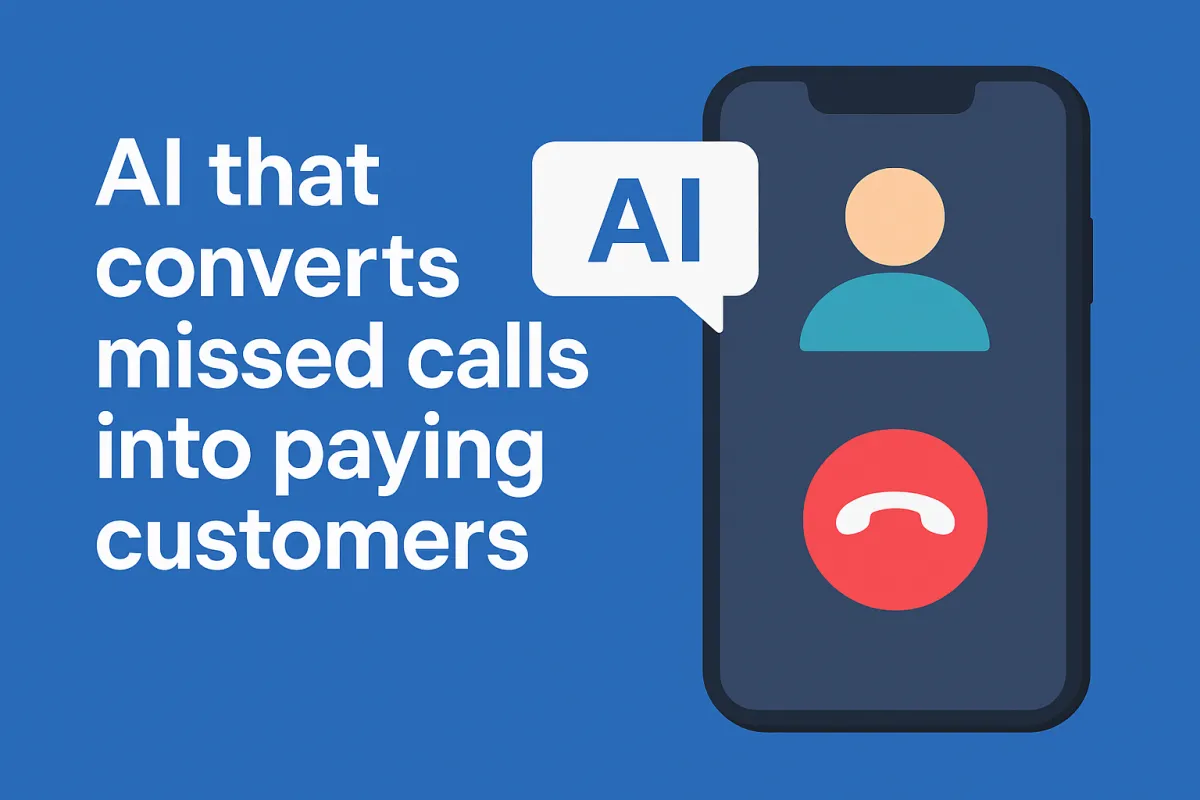Never Miss a Customer Opportunity again

Missed Calls = Missed Revenue
60% of small business calls go unanswered during busy hours, 40% of customers never call back and Staff can’t manage calls, bookings, and service at the same time.
AI + Automation That Works for You
We combine AI voice agents, chatbots, CRM, and automation tools into one system that runs your business even when you’re off the clock.





Our Core Solutions
Voice AI Receptionist
Your 24/7 call-answering assistant that takes orders, books appointments, and answers FAQs automatically.
Missed Call Text-Back
Never lose a lead again. When you miss a call, your system instantly sends a personalized text to engage the customer and keep the conversation going.
Automated Follow-Up
Stay top-of-mind with automatic SMS, email, and voicemail follow-ups. Convert more leads into loyal customers with zero manual effort.
CRM & Pipeline Management
Track every lead from first call to closed sale. Visual pipelines, contact notes, and reminders keep your team organized and focused.
Smart Websites That Convert
Modern, fast-loading websites built to attract traffic, capture leads, and integrate with your automation system.
Surveys & Forms
Collect feedback, run lead quizzes, or customer satisfaction surveys that sync directly into your CRM.
AI Chatbot
Engage visitors on your site or social channels. Our AI chatbot answers instantly, qualifies leads, and books appointments while you sleep.
Set It and Scale It
Connect — We integrate with your existing phone, calendar, and CRM.
Customize — Train the AI with your business details, services, and tone.
Automate — Sit back while the system handles calls, messages, and follow-ups.
Frequently Asked Questions
Quick answers to the most common questions.
What exactly does your AI Voice Assistant do?
Our Voice AI answers incoming calls 24/7 — just like a real receptionist.
It can take orders, answer common questions, book appointments, and even text customers if they prefer messaging instead of calling.
Do I need to change my existing phone number?
No. We can connect your current business number to our system in minutes.
Your customers will keep calling the same number — our AI just picks up instantly when you’re busy or closed.
What happens if the AI can’t answer a question?
If the AI doesn’t know the answer, it can automatically forward the call, send a text, or create a note in your CRM so your team can follow up.
You’re always in control.
What kind of businesses can use this system?
Our platform works for any service-based business — restaurants, dental clinics, salons, gyms, real estate agents, veterinarians, repair shops, and more.
If your business gets calls, texts, or bookings — we can automate it.
What if I already use another booking or POS system?
No problem - we integrate with popular tools like Google Calendar, Toast, Square, MindBody, Calendly, and more.
Our system works alongside your existing tools, not against them.
What if I need help later?
You’ll have access to live chat support, training videos, and a dedicated success manager who can help tweak your automations anytime.
How long does setup take?
Most businesses are up and running within 24–48 hours.
Our team handles setup, customization, and testing. All you do is approve the final version.
Can I train or update the AI myself?
Yes. You can easily update your AI’s responses, hours, and service info from your dashboard.
If you prefer, our team can manage all updates for you.
What is the Missed Call + Follow-Up Automation combo?
This automation instantly texts missed callers and sends follow-up messages via SMS, email, or voicemail until they reply or book. It ensures no lead falls through the cracks.
How does your CRM and Pipeline help my business?
All your leads, calls, and conversations are stored in one place. You can track every stage, from first contact to closed sale and even automate follow-ups based on pipeline stage.
What does the AI Chatbot do?
The chatbot lives on your website or social media pages. It greets visitors, answers questions, collects info, and books appointments automatically just like a real assistant.
Do you offer website design too?
Yes. We build fast, mobile-friendly websites optimized for SEO, conversion, and automation.
Your site connects directly with your AI, chatbot, and CRM.
What about surveys and feedback forms?
You can easily create surveys, intake forms, or lead capture forms.
Responses are automatically saved in your CRM and can trigger follow-up messages or review requests.
Can this system help me get more Google reviews?
Absolutely. After each appointment, our system sends friendly review requests to happy customers helping you grow your reputation on autopilot.
How secure is my data?
We follow strict data protection and encryption standards. Your information is never sold or shared outside of approved integrations or legal requirements.
How much does it cost?
We offer flexible monthly plans depending on your needs, starting from basic call automation to full CRM and AI integration.
Contact us for a personalized quote or demo.
Can I cancel anytime?
Yes. Our subscriptions are month-to-month with no long-term contracts. You can pause or cancel anytime with written notice.
Do you offer customer support?
Yes. You’ll get live chat support, training videos, and a dedicated success manager to help you with setup, automation, and updates.
Do you offer a free trial or demo?
Yes! You can schedule a free demo to see exactly how our Voice AI and automation tools work for your business.
How do I get started?
It’s simple:
Schedule a free demo
Customize your setup
Go live within 48 hours
Your business will never miss a lead again.
© UcornX 2025
All Rights Reserved
